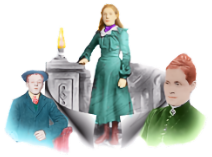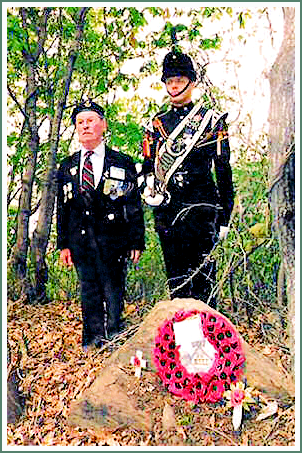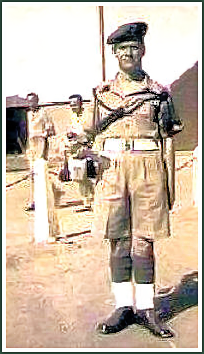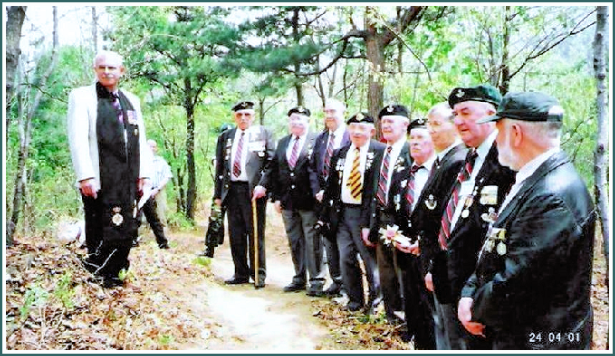


Bill Griffiths
Bill served in the Kings Shropshire Light Infantry for four decades he joined in 1946 and retired in 1984, his story and humorous memoirs can be viewed from the Korea 1951 menu "Bill Griffiths story" Bill has been a great help to me in putting parts of the Korea site together and in doing so has become a great friend and for his assistance I will always be eternally grateful.

Bill Griffiths was in Korea with the KSLI at the same time as George Yapp he was in the adjacent platoon to George, when L/Cpl Yapp and L/Cpl Hanlon were both killed in the action, along with eleven others that were wounded on this day, one of which was Bills brother Cpl Bob Griffiths. This was in the first major battle that the KSLI regiment fought in Korea 20th May 1951 it was on hill 416.

Sadly Bob passed away in 2011 he will be dearly missed by his family and friends.
Bob seriously wounded in the action lay on the next stretcher to my father [George Yapp] whilst awaiting evacuation to the mobile army service hospital [MASH] unfortunately Bill told me that he knew that George had died on the stretcher next to him early on whilst waiting to be evacuated.
Bill Griffiths and an Infantry bugler in Korea at hill 416. This picture taken on his revisit of Korea 2002
Brother Cpl Bob Griffiths this picture was taken in 1946 when Bob was the Co's Bugler. at Khartoum, in the Sudan
My Experiences in the Far East
By Bill Griffiths Ex K.S.L.I.
As a very young soldier only nineteen years of age, I was sent out to the Far East to serve with my Regiment The Kings Shropshire Light Infantry.
Initially our role was to act as a Garrison Force in Hong Kong, to defend the border with mainland China against the mighty Chinese armed forces.
There, I was to witness the degradation, the suffering, and the desperate conditions which many of the local Chinese had to suffer as a result of the four years of Japanese occupation from 1942 to 1946.
I saw old men and women, young children, living in poverty, with no roof over their head, some using old sheets of galvanized iron and wooden props as a makeshift home.
We were living in tents at the time, but this was pure luxury compared to what they had to endure.
I was at a very impressionable age and found it very hard to come to terms with what I was witnessing.
Just eighteen months later we were sent to serve with The United Nations Forces to take part in the war in Korea.
We had to land first of all in Japan, where we were to be kitted out and battle trained in readiness for the role, which we were to play.
Whilst in Japan I had the opportunity to visit Hiroshima where the atomic bomb had been dropped in 1946.
The scenes I witnessed there were absolutely horrific. There was hardly a building standing intact. I stood at the steps of the ruins of what had been a very large church, now just a shell of twisted iron in the midst of tons of rubble. I turned and saw many crippled and horribly burned and scarred bodies of men women and children, literally crawling along on the bits of limbs that remained on their torsos. They were begging for help, food, and indeed any form of assistance to make what was left of their lives in some way bearable. I could not believe that man could have inflicted this carnage on his fellow man, no matter what his race, creed, or motive.
We then went on to Korea, where the Regiment served for seventeen months, during this time I was to witness even more of the horrors of war and the suffering caused to so many hundreds of thousands of people, many of whom had no choice in what was going on around them, their families and their loved ones.
During the heavy fighting that took place sixty two soldiers from our Regiment lost their lives, and many hundreds were wounded.
I lost a lot of my comrades, many still in their teens, and some, having served in the forces for only a matter of months before losing their lives.
I went back to Korea in the April of 2002 and I climbed the hill where our first major battle took place, leaving two dead and eleven wounded. One of the wounded, being my elder Brother who, luckily survived his wounds. He is one of the fortunate ones, now in his late seventies who can still enjoy life.
Those three years in the Far East taught me a lot about life and death. Things that I could never have been taught in school and things that the average person will never learn.
It taught me to understand others weaknesses and necessities and to help to relieve them whenever possible.
It was a very sad and traumatic time, which to this day, causes me to reflect on my beliefs and the way I was brought up as a young boy, and to realize that God has given me a life that I must appreciate, and live to the full, whilst sharing love and affection with those around me, and always remembering those who gave their lives in the cause of freedom for others all those years ago.
Bill Griffiths.
© Bill Griffiths 2001-2022
Korea Revisited April 2001
In April 2001 a number of the Kings Shropshire Light Infantry Korean veterans revisited Korea they made there way up to hill 416 the position of their first battle with the North Korean and the Chinese communist troops. It was here where they held a ceremony of remembrance to pay their respects to those who were killed and wounded in this battle

Top picture is group of ex KSLI on visit to Korea in April 2001 on the hill where your father L/Cpl Yapp was killed.
We held a memorial service there to honour him and Lance Corporal Hanlon who was also killed. I am holding
poppy crosses which I laid in their honour.

This picture shows me Bill Griffiths with KSLI Bugler after the service
Bill Griffiths.
20-11-2023 I am very Sad to report the passing of Bill Griffiths.
RIP Bill Griffiths passed away December 2022
This information and photographs was kindly gifted by Bill Griffiths to whom I am truly grateful. It fills another blank in my quest to uncover more about my father who was killed in action on this site of the KSLI's first battle in the Korean conflict 20th May 1951.

| About us |
| Contact us |
| our policy |
| Viewing Notes |
| Acknowledgements |
| Yapp family |
| james Yapps Cockney history |
| William and Eliza |
| Hannah and Mathew |
| James William Yapp |
| Mathew and Alice |
| Aussie connection |
| Family not forgotten |
| Origination 1 |
| Origination 2 |
| Origination 3 |
| KSLI 1951 |
| KSLI journal |
| Journal pt.1 |
| Journal pt.2 |
| Bill Griffiths |
| LCpl Hanlon |
| Bob_West |
| KSLI Roll of Honour |
| News Clips |
| Military Career |
| George Yapp KIA Korea |
| George service pictures |
| Communications |
| Georges Letters 1 |
| Georges letters 2 |
| Last letters home |
| Georges Awards |
| UN Memorial Cemetery Korea |
| Georges Story |
| Exchange rates |
| World Time |
| Speed Tester |